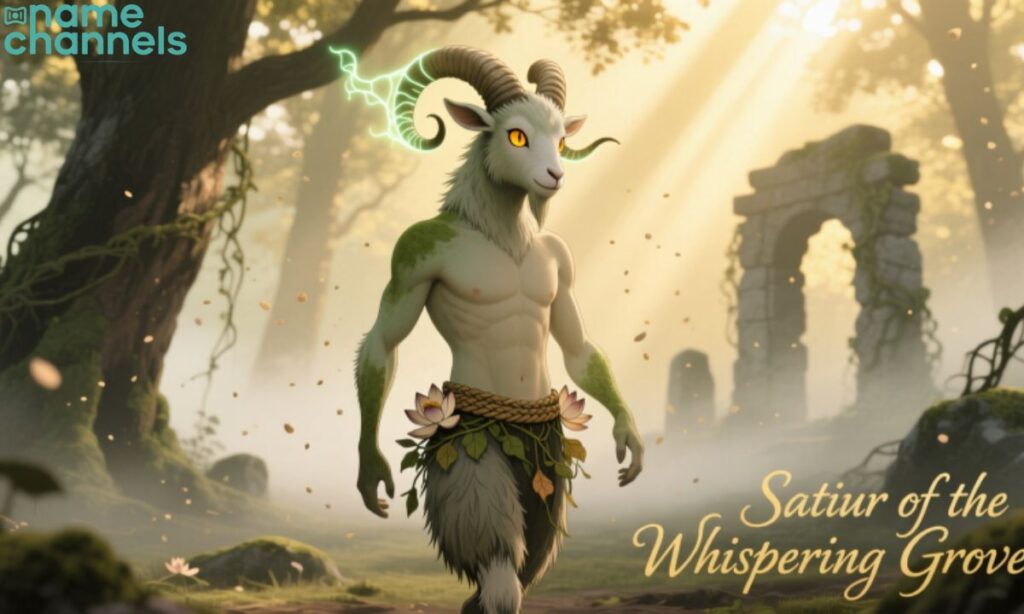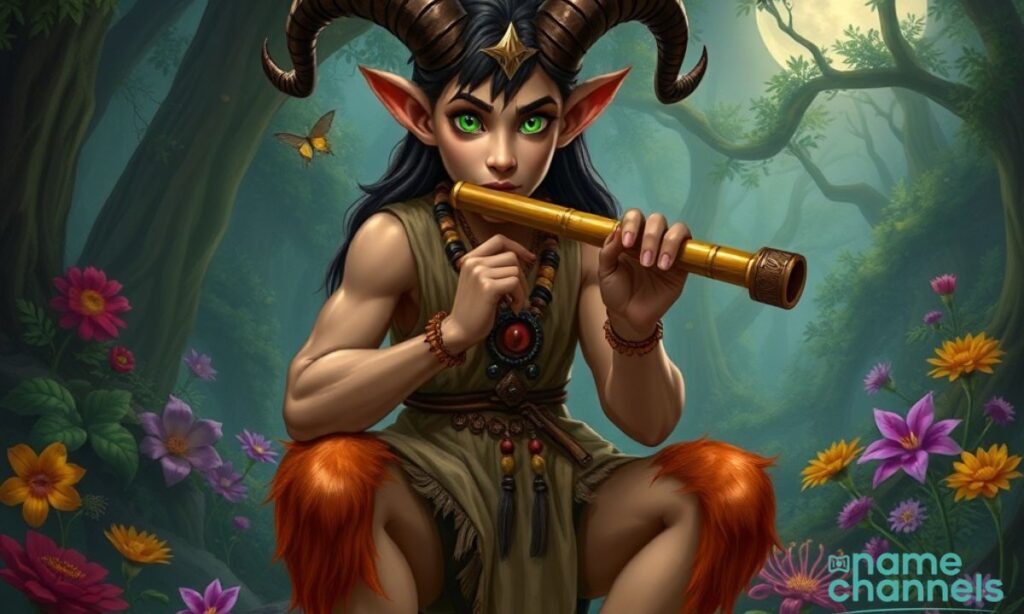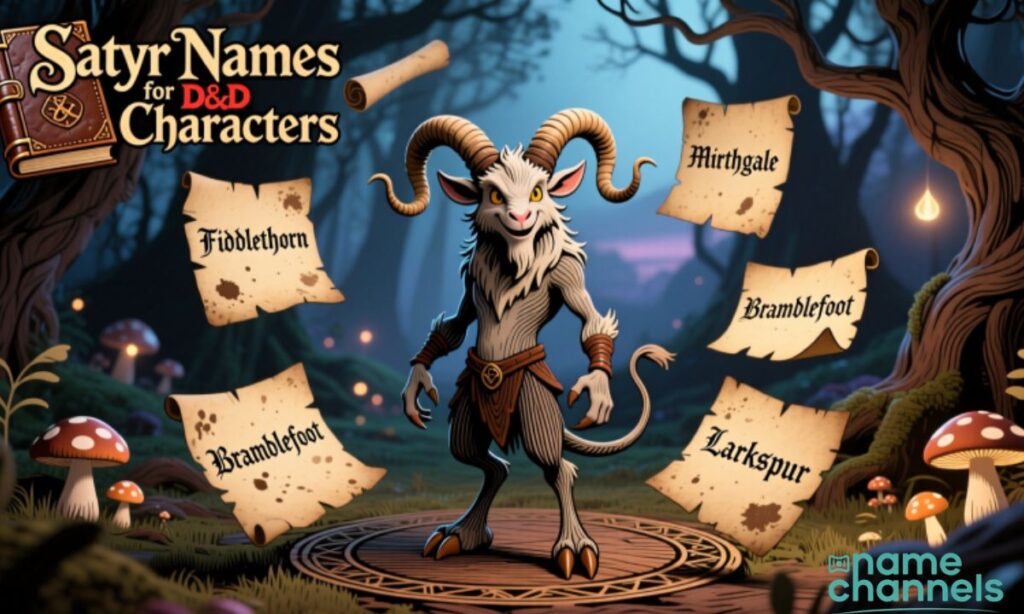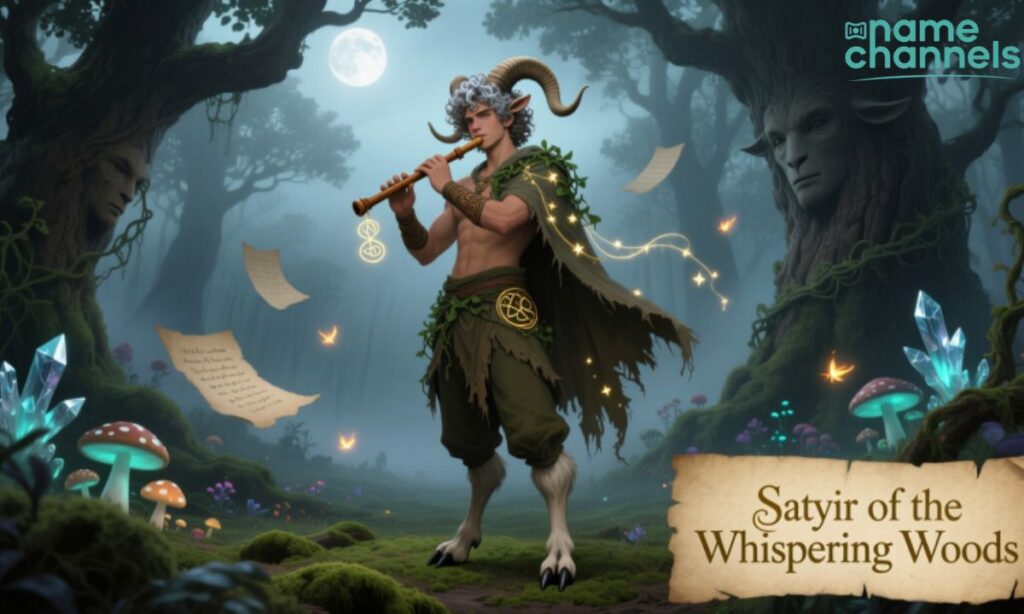Satyrs, the wild and mischievous spirits of nature from Greek mythology, are often depicted as half-human and half-goat beings who embody freedom, revelry, and the untamed forces of the forest. Their names often carry meanings tied to music, wine, lust, nature, and chaos — reflecting their close connection to Dionysus, the god of wine and ecstasy.
In this collection of 500+ Satyr names with origins and meanings, you’ll discover names drawn from Greek roots, ancient myths, fantasy worlds, and modern adaptations. Each name reveals something about the Satyr’s character — whether playful, wise, or wild — making this list perfect for writers, gamers, and mythology enthusiasts alike.
Satyr Male Names

- Pan (Greek) – God of the wild; original satyr deity
- Silenus (Greek) – Oldest satyr; Dionysus’s companion and tutor
- Marsyas (Greek) – Satyr who challenged Apollo to music contest
- Ampelus (Greek) – Beloved satyr of Dionysus; turned into vine
- Leneus (Greek) – Wine-press satyr; festival celebrant
- Pherespondus (Greek) – “Gift-bringer”; fertility satyr
- Petraeus (Greek) – “Of the rocks”; mountain dweller
- Lycon (Greek) – “Wolf-like”; wild hunter satyr
- Daphnis (Greek) – “Laurel”; legendary pastoral poet
- Thyrsis (Greek) – “Staff-bearer”; shepherd satyr
- Corydon (Greek) – Rustic shepherd; pastoral name
- Medon (Greek) – “Ruler”; leader of satyr band
- Agreus (Greek) – “Hunter”; savage woodland satyr
- Nomios (Greek) – “Pastoral”; pasture guardian
- Phorbas (Greek) – “Feeder”; herdsman satyr
- Lenaeus (Greek) – “Of the wine-press”; harvest celebrant
- Astraeus (Greek) – “Starry”; night-wandering satyr
- Chromis (Greek) – “Neigh”; horse-tailed satyr
- Hypsipyles (Greek) – “High gate”; mountain satyr
- Napaeus (Greek) – “Of the glen”; valley dweller
- Oreius (Greek) – “Mountain”; highland satyr
- Pithos (Greek) – “Wine jar”; drinking companion
- Sicinnis (Greek) – “Dancer”; wild dance performer
- Thiasus (Greek) – “Revel”; party member
- Bromius (Greek) – “Noisy”; loud celebrant
- Komos (Greek) – “Revelry”; festive satyr
- Lykos (Greek) – “Wolf”; predatory nature
- Petros (Greek) – “Stone”; rocky terrain dweller
- Syrinx (Greek) – “Pan pipe”; musical instrument maker
- Tityrus (Roman/Greek) – Pastoral shepherd; Virgil’s satyr
- Aegipan (Greek) – “Goat-Pan”; half-goat deity
- Criasus (Greek) – “Ram”; horned satyr
- Gemon (Greek) – “Full”; abundance bringer
- Hylaeos (Greek) – “Of the forest”; woodland sprite
- Maron (Greek) – Wine-maker; priest of Apollo
- Oestrus (Greek) – “Gadfly”; frenzied dancer
- Pholus (Greek) – Wise centaur-satyr; cave dweller
- Satyrus (Greek) – Generic satyr; “lustful one”
- Tragelaphus (Greek) – “Goat-deer”; hybrid creature
- Vriesea (Greek) – “Moss-covered”; forest dweller
- Chiron (Greek) – Wise centaur; similar to satyrs
- Faunus (Roman) – Roman equivalent of Pan
- Inuus (Roman) – “Fertilizer”; fertility god
- Silvanus (Roman) – “Of the woods”; forest protector
- Aegipan (Greek) – Saved Zeus; constellation
- Krotos (Greek) – “Applause”; invented clapping
- Grover (Modern/Greek) – “Grove dweller”; modern satyr
- Gleeson (Greek/Irish) – Satyr trainer; Mr. Tumnus type
- Timberwick (Fantasy) – “Forest candle”; woodland guide
- Branchfoot (Fantasy) – “Tree-footed”; nature spirit
Satyr Female Names

- Nymphaea (Greek) – “Water lily”; nymph companion
- Satyra (Greek) – Female satyr; “wild one”
- Dryope (Greek) – “Oak face”; tree nymph satyr
- Syrinx (Greek) – “Pan pipe”; transformed into reeds
- Echo (Greek) – “Sound”; mountain nymph companion
- Pitys (Greek) – “Pine tree”; loved by Pan
- Oenone (Greek) – “Wine queen”; mountain nymph
- Aegle (Greek) – “Radiance”; one of the Hesperides
- Carya (Greek) – “Walnut tree”; beloved of Dionysus
- Lyssa (Greek) – “Wild frenzy”; spirit of rage
- Methe (Greek) – “Drunkenness”; wine spirit
- Phoebe (Greek) – “Bright”; woodland dancer
- Chloris (Greek) – “Green”; spring and flowers
- Antheia (Greek) – “Flowery”; goddess of blossoms
- Ianthe (Greek) – “Violet flower”; nature spirit
- Calypso (Greek) – “Concealer”; island nymph
- Daphne (Greek) – “Laurel”; transformed into tree
- Fauna (Roman) – Female version of Faunus
- Silvana (Roman) – “Of the forest”; woodland spirit
- Melia (Greek) – “Ash tree”; tree nymph
- Leuce (Greek) – “White poplar”; loved by Hades
- Thalia (Greek) – “Blooming”; muse of comedy
- Erato (Greek) – “Lovely”; muse of love poetry
- Melite (Greek) – “Honey sweet”; pastoral nymph
- Phaenna (Greek) – “Shining”; grace of light
- Aglaia (Greek) – “Splendor”; one of the Graces
- Euphrosyne (Greek) – “Mirth”; joy and merriment
- Thyone (Greek) – “Inspired frenzy”; Dionysian name
- Bromia (Greek) – “Loud one”; festival celebrant
- Nymphadora (Greek) – “Gift of nymphs”; woodland blessed
- Caprina (Latin) – “Goat-like”; she-goat spirit
- Aegea (Greek) – “Shield”; protective satyr
- Coryphae (Greek) – “Summit”; mountain dancer
- Napaea (Greek) – “Glen maiden”; valley dweller
- Oreias (Greek) – “Mountain”; highland nymph
- Limnia (Greek) – “Meadow”; grassland spirit
- Hylea (Greek) – “Forest”; woodland wanderer
- Aulonias (Greek) – “Glen”; ravine dweller
- Petraea (Greek) – “Rocky”; cliff dancer
- Rhyssa (Greek) – “Mountain stream”; water spirit
- Bryony (English/Greek) – “Climbing plant”; vine maiden
- Fern (English) – Forest plant; nature spirit
- Hazel (English) – Sacred tree; woodland witch
- Juniper (Latin) – “Young”; berry tree spirit
- Willow (English) – “Slender”; tree nymph
- Ivy (English) – “Climbing”; binding plant spirit
- Rowan (Irish) – Mountain ash; protective tree
- Briar (English) – “Thorny shrub”; wild rose spirit
- Meadow (English) – “Grassland”; open field dancer
- Thistle (Scottish) – “Prickly plant”; highland spirit
Gender-Neutral Satyr Names

- Pan (Greek) – “All”; god of the wild
- River (English) – “Flowing water”; nature spirit
- Sage (Latin) – “Wise one”; herb and wisdom
- Ash (English) – Tree or fire remnant; nature
- Rowan (Irish) – Mountain ash tree; protection
- Bramble (English) – “Thorny bush”; wild scrub
- Fern (English) – Ancient plant; forest floor
- Moss (English) – “Bog plant”; soft ground cover
- Reed (English) – “Water plant”; marsh dweller
- Cedar (Latin) – Strong tree; aromatic wood
- Juniper (Latin) – “Young”; berry-bearing tree
- Hazel (English) – “Nut tree”; divination wood
- Briar (English) – “Thorny patch”; wild rose
- Thicket (English) – “Dense growth”; hidden grove
- Brook (English) – “Small stream”; babbling water
- Vale (Latin) – “Valley”; lowland hollow
- Glen (Scottish) – “Valley”; secluded dell
- Heath (English) – “Wasteland”; moorland plant
- Lark (English) – “Songbird”; morning singer
- Wren (English) – “Small bird”; forest chirper
- Robin (English) – “Bright fame”; red-breasted bird
- Sparrow (English) – “Small bird”; common spirit
- Raven (English) – “Dark bird”; prophetic
- Finch (English) – “Songbird”; cheerful spirit
- Thistle (Scottish) – “Prickly plant”; highland flower
- Clover (English) – “Meadow plant”; lucky three-leaf
- Thyme (Greek) – “Courage herb”; fragrant plant
- Basil (Greek) – “Royal herb”; aromatic leaf
- Sorrel (French) – “Reddish-brown”; tangy herb
- Cypress (Greek) – “Evergreen tree”; mourning symbol
- Laurel (Latin) – “Bay tree”; victory crown
- Myrtle (Greek) – “Evergreen shrub”; love symbol
- Oleander (Greek) – “Flowering shrub”; poisonous beauty
- Aspen (English) – “Quaking tree”; trembling leaves
- Birch (English) – “White tree”; renewal symbol
- Alder (English) – “Water-loving tree”; river guardian
- Maple (English) – “Tree”; sweet sap producer
- Oakley (English) – “Oak meadow”; strength clearing
- Lyric (Greek) – “Song words”; musical poetry
- Echo (Greek) – “Reflected sound”; mountain voice
- Meadow (English) – “Grassland”; open pasture
- Forest (Latin) – “Woods”; tree collective
- Wilder (English) – “Untamed”; wilderness spirit
- Storm (English) – “Tempest”; wild weather
- Briar (English) – “Thorny vine”; wild growth
- Piper (English) – “Flute player”; Pan pipes musician
- Dancer (English) – “One who dances”; revel spirit
- Riddle (English) – “Mystery”; puzzling trickster
- Flicker (English) – “Quick movement”; darting light
- Whisper (English) – “Soft sound”; gentle breeze voice
Unique Satyr Names

- Thornwhisper (English) – “Thorn talker”; speaks to brambles
- Mosshoof (English) – “Moss-covered foot”; forest walker
- Brindlecap (English) – “Streaked hat”; spotted mushroom
- Fennelhorn (English) – “Herb antler”; aromatic crown
- Cleftstone (English) – “Split rock”; canyon dweller
- Tanglebranch (English) – “Twisted wood”; maze creator
- Duskpiper (English) – “Twilight musician”; evening player
- Nettleback (English) – “Stinging spine”; prickly defender
- Brookhoof (English) – “Stream foot”; water crosser
- Ivytwist (English) – “Coiling vine”; climbing spirit
- Acornwhirl (English) – “Nut spinner”; oak seed dancer
- Thistlebeard (English) – “Spiky chin”; prickly elder
- Sappaw (English) – “Tree blood foot”; resin tracker
- Reedpipe (Greek/English) – “Marsh flute”; wetland musician
- Pinecrest (English) – “Conifer peak”; mountain dweller
- Brackenfoot (English) – “Fern hoof”; undergrowth runner
- Willowbend (English) – “Flexible tree”; graceful dancer
- Heatherbell (English) – “Moorland flower”; highland ringer
- Burroak (English) – “Strong tree”; sturdy protector
- Mistgaze (English) – “Fog watcher”; dawn observer
- Cloverleap (English) – “Lucky jump”; meadow bouncer
- Fernshade (English) – “Plant shadow”; cool shelter
- Rootwander (English) – “Tree base roamer”; forest traveler
- Petalhorn (English) – “Flower antler”; blooming crown
- Honeydew (English) – “Sweet moisture”; nectar collector
- Vinegrasp (English) – “Climbing holder”; grape tender
- Lichenclaw (English) – “Fungus nail”; ancient marker
- Cricksong (English) – “Creek melody”; stream music
- Mulchstep (English) – “Decay walker”; compost dancer
- Barkwhisker (English) – “Tree skin hair”; rough beard
- Gnarltooth (English) – “Twisted fang”; knotted bite
- Seedskip (English) – “Kernel hop”; planting dancer
- Dewcatcher (English) – “Morning collector”; dawn gatherer
- Frondfoot (English) – “Leaf hoof”; fern stepper
- Twigtangle (English) – “Stick mess”; nest builder
- Moldspore (English) – “Fungus seed”; mushroom spreader
- Canopyleap (English) – “Tree-top jump”; high climber
- Berrystain (English) – “Fruit mark”; juice dribbler
- Rustlewind (English) – “Leaf breeze”; autumn spirit
- Brambleheart (English) – “Thorny core”; prickly soul
- Meadowmirth (English) – “Grassland joy”; field reveler
- Puddlesplash (English) – “Water jump”; playful hopper
- Hollowlog (English) – “Empty trunk”; den dweller
- Nectarsip (English) – “Sweet drink”; flower feeder
- Stumpfoot (English) – “Tree base step”; old growth walker
- Wildroot (English) – “Untamed base”; free spirit
- Leafmulch (English) – “Decay layer”; forest floor maker
- Vineswing (English) – “Climbing arc”; rope jumper
- Moonpetal (English) – “Night flower”; lunar bloom
- Grovekeeper (English) – “Sacred wood guard”; forest protector
Satyr OC Names

- Mελος (Melos) (Greek) – “Song”; musical wanderer
- Thrasher (English) – “Wild dancer”; thrashing reveler
- Brambleheart (English) – “Thorny soul”; protective nature
- Cyprian (Greek) – “From Cyprus”; Mediterranean spirit
- Lyric (Greek) – “Lyre player”; poetic musician
- Fennec (Arabic) – “Desert fox”; cunning trickster
- Oleander (Greek) – “Toxic beauty”; dangerous charm
- Quickhoof (English) – “Fast foot”; swift runner
- Coriander (Greek) – “Spice”; flavorful personality
- Vesper (Latin) – “Evening star”; twilight performer
- Ridley (English) – “Reed clearing”; marsh dweller
- Calix (Greek) – “Chalice”; wine cup bearer
- Indigo (Greek) – “Deep blue”; mysterious dye
- Larkspur (English) – “Lark’s spur”; wildflower spirit
- Pippin (English) – “Apple seed”; small and mighty
- Yarrow (English) – “Healing herb”; medicinal plant
- Sorrel (French) – “Reddish-brown”; tangy herb satyr
- Cobalt (German) – “Blue mineral”; rare element
- Madrigal (Spanish) – “Song”; part harmony singer
- Briony (Greek) – “Climbing vine”; wild growth
- Tempo (Italian) – “Time/rhythm”; musical beat keeper
- Saffron (Arabic) – “Yellow spice”; golden threads
- Rascal (English) – “Mischief-maker”; playful troublemaker
- Banjo (African) – “String instrument”; folk musician
- Cricket (English) – “Chirping insect”; night singer
- Clove (Latin) – “Nail spice”; aromatic bud
- Ziggy (German) – “Victory protector”; modern twist
- Anthem (Greek) – “Sacred song”; hymn singer
- Pepper (Sanskrit) – “Berry spice”; fiery personality
- Riff (English) – “Musical phrase”; improviser
- Tambour (French) – “Drum”; rhythm keeper
- Rebel (Latin) – “Revolutionary”; rule breaker
- Cadence (Latin) – “Rhythm”; flowing beat
- Flint (English) – “Fire starter”; spark creator
- Whistler (English) – “Tune maker”; melody breather
- Zigzag (French) – “Angular path”; unpredictable
- Chord (Greek) – “Musical harmony”; note blender
- Ruckus (Scandinavian) – “Uproar”; chaos bringer
- Fiddle (Latin) – “String instrument”; folk player
- Jazz (American) – “Musical style”; improvisational
- Sprout (English) – “New growth”; young satyr
- Bongo (African) – “Drum pair”; percussion player
- Shimmer (English) – “Soft glow”; light dancer
- Riff (English) – “Repeated phrase”; catchy tune
- Dizzy (English) – “Lightheaded”; spinning dancer
- Tumble (German) – “Fall over”; acrobatic spirit
- Skipper (Dutch) – “Jumper”; hopping traveler
- Jinx (Latin) – “Spell”; lucky/unlucky charm
- Whimsy (English) – “Playful fancy”; capricious soul
- Frolic (Dutch) – “Merry play”; joyful dancer
Satyr Names for Dungeons & Dragons Characters

- Xandros Willowpipe (Greek) – “Defending warrior”; bard explorer
- Thalios Greenvine (Greek) – “Blooming”; nature cleric
- Kaelos Swifthoof (Greek) – “Burning”; rogue scout
- Orpheon Songweaver (Greek) – “Darkness”; musical bard
- Bryaxis Thornshield (Greek) – “Full of moss”; ranger defender
- Nikeros Meadowstep (Greek) – “Victory”; monk wanderer
- Pyxis Starhorn (Greek) – “Box”; druid stargazer
- Corin Windwhisper (Celtic) – “Spear”; air genasi bard
- Draven Oakfist (English) – “Hunter”; barbarian warrior
- Fenwick Moonpipe (English) – “Marsh farm”; lunar bard
- Rizz Quickfoot (Modern) – “Charisma”; fast-talking rogue
- Jinx Berryblast (Latin) – “Spell”; wild magic sorcerer
- Scamp Thistletoe (English) – “Rascal”; prankster thief
- Fidget Tanglewood (English) – “Restless”; hyperactive bard
- Rascal Honeytongue (English) – “Mischief”; silver-tongued charlatan
- Moxie Bramblebounce (American) – “Courage”; energetic acrobat
- Chaos Willowisp (Greek) – “Disorder”; illusion wizard
- Prankster Pipewhistle (English) – “Joker”; comedy bard
- Dizzy Cloverleap (English) – “Confused”; lucky fool
- Whimsy Fernflicker (English) – “Fancy”; fey warlock
- Verdant Mossback (Latin) – “Green”; circle of the land druid
- Sylvan Rootwalker (Latin) – “Forest”; nature guardian
- Oakley Strongbark (English) – “Oak meadow”; defender
- Ashwyn Leafdancer (English) – “Ash friend”; wind monk
- Cypress Shadegrove (Greek) – “Tree”; twilight ranger
- Hawthorn Wildmane (English) – “Hedge thorn”; beast master
- Birch Dewcaller (English) – “Bright tree”; water druid
- Rowan Stormhoof (Irish) – “Little red”; tempest cleric
- Elm Earthsong (English) – “Red tree”; spore druid
- Juniper Brookstep (Latin) – “Young”; river warden
- Valorian Goldhorn (Latin) – “Brave”; noble paladin
- Celestine Starmantle (Latin) – “Heavenly”; celestial warlock
- Amadeus Sweetlyre (Latin) – “Love of god”; virtuoso bard
- Silvanus Vineheart (Roman) – “Forest god”; archdruid
- Harmonix Crystalpipe (Greek) – “Joint”; college of glamour bard
- Lyrical Dreamweaver (Greek) – “Musical”; eloquence bard
- Seraphon Gladewatch (Hebrew) – “Fiery”; oath of ancients paladin
- Baroque Echohorn (French) – “Ornate”; creation bard
- Cadenza Moonchord (Italian) – “Solo passage”; maestro bard
- Aurelius Dawnpipe (Latin) – “Golden”; light cleric
- Nox Shadowhoof (Latin) – “Night”; gloom stalker ranger
- Thorn Ravensong (English) – “Spike”; whispers bard
- Grimm Nightshade (German) – “Fierce”; assassin rogue
- Moros Ashenpipe (Greek) – “Doom”; grave cleric
- Raven Duskmantle (English) – “Dark bird”; shadow sorcerer
- Vex Blackvine (Latin) – “Trouble”; hexblade warlock
- Obsidian Thornwhisper (Greek) – “Dark glass”; spore druid
- Malice Briarthorn (Latin) – “Evil”; conquest paladin
- Shade Emberpipe (English) – “Shadow”; fiend warlock
Satyr Names in Greek Mythology

- Pan (Greek) – “All”; god of the wild, shepherds, and flocks
- Silenus (Greek) – “Moving to and fro”; Dionysus’s foster father and tutor
- Marsyas (Greek) – “Flayer”; challenged Apollo to music contest
- Ampelus (Greek) – “Vine”; beloved of Dionysus, became grapevine
- Leneus (Greek) – “Wine press”; follower of Dionysus
- Pherespondus (Greek) – “Gift bringer”; fertility satyr
- Petraeus (Greek) – “Of the rocks”; mountain dwelling satyr
- Lycon (Greek) – “Wolf-like”; wild nature satyr
- Daphnis (Greek) – “Laurel”; legendary pastoral poet and musician
- Agreus (Greek) – “Hunter”; savage woodland satyr
- Nomios (Greek) – “Pastoral”; guardian of pastures
- Phorbas (Greek) – “Feeder”; herdsman and provider
- Lenaeus (Greek) – “Of the wine-vat”; harvest celebrant
- Astraeus (Greek) – “Starry”; night-wandering satyr
- Chromis (Greek) – “Neighing”; horse-like satyr
- Napaeus (Greek) – “Of the glen”; valley dweller
- Oreius (Greek) – “Mountain”; highland satyr
- Pithos (Greek) – “Wine jar”; drinking companion
- Sicinnis (Greek) – “Dancer”; wild dance performer
- Thiasus (Greek) – “Revel”; member of Dionysian procession
- Bromius (Greek) – “Noisy”; loud celebrant of Dionysus
- Komos (Greek) – “Revelry”; festive procession member
- Lykos (Greek) – “Wolf”; predatory satyr nature
- Petros (Greek) – “Stone”; rocky terrain dweller
- Syrinx (Greek) – “Pan pipes”; nymph transformed into reeds
- Aegipan (Greek) – “Goat-Pan”; half-goat deity companion
- Criasus (Greek) – “Ram”; horned satyr warrior
- Gemon (Greek) – “Full”; bringer of abundance
- Hylaeos (Greek) – “Of the forest”; woodland sprite
- Maron (Greek) – “Wine maker”; priest of Apollo’s shrine
- Oestrus (Greek) – “Gadfly”; frenzied dancer and reveler
- Pholus (Greek) – “Cave dweller”; wise centaur-satyr hybrid
- Tragelaphus (Greek) – “Goat-deer”; hybrid creature form
- Krotos (Greek) – “Applause”; invented clapping, became constellation
- Chiron (Greek) – “Hand”; wise centaur similar to satyrs
- Inuus (Roman/Greek) – “Fertilizer”; fertility god aspect
- Faunus (Roman/Greek) – “To favor”; Roman equivalent of Pan
- Silvanus (Roman/Greek) – “Of the woods”; forest protector deity
- Priapos (Greek) – “Priapus”; fertility god with satyr features
- Comus (Greek) – “Revel”; god of festivity and chaos
- Methe (Greek) – “Drunkenness”; personification of intoxication
- Acis (Greek) – “Point”; shepherd loved by Galatea
- Dryope (Greek) – “Oak face”; associated with woodland spirits
- Palaemon (Greek) – “Wrestler”; marine deity with satyr connections
- Eurytion (Greek) – “Wide-ruling”; centaur at Dionysian feasts
- Nessus (Greek) – “Duck”; centaur ferryman with satyr traits
- Pholos (Greek) – “Cave”; hospitable centaur-satyr
- Crotus (Greek) – “Beating”; Muses’ companion, Sagittarius constellation
- Astakos (Greek) – “Lobster”; rural satyr companion
- Terpon (Greek) – “Delighting”; joy-bringing satyr musician
Satyr Names in Roman Mythology

- Faunus (Roman) – “To favor”; god of fields and forests
- Silvanus (Roman) – “Of the woods”; protector of forests
- Inuus (Roman) – “Entry”; fertility and pastoral god
- Lupercus (Roman) – “Wolf warder”; protector from wolves
- Pan (Roman/Greek) – “All”; adopted Greek god of wild
- Aegipan (Roman) – “Goat-Pan”; rustic deity form
- Fatuus (Roman) – “Prophetic”; oracular woodland spirit
- Picumnus (Roman) – “Woodpecker”; agricultural deity
- Pilumnus (Roman) – “Pestle”; grain processing god
- Virbius (Roman) – “Man twice”; forest king reborn
- Consus (Roman) – “Sower”; harvest and storage god
- Liber (Roman) – “Free”; wine and fertility god
- Terminus (Roman) – “Boundary”; rural border protector
- Vertumnus (Roman) – “Changer”; seasons and orchards
- Pomona (Roman) – “Fruit”; orchard keeper deity
- Pales (Roman) – “Pale”; shepherds and livestock protector
- Saturnus (Roman) – “Sower”; agriculture and time god
- Quirinus (Roman) – “Spear-bearer”; pastoral warrior god
- Robigus (Roman) – “Rust”; crop disease averter
- Picus (Roman) – “Woodpecker”; prophetic forest king
- Tiberinus (Roman) – “Of the Tiber”; river god
- Volturnus (Roman) – “Rolling”; river god spirit
- Portunus (Roman) – “Harbor”; gateway protector
- Fontus (Roman) – “Spring”; water source guardian
- Sterculius (Roman) – “Manure”; fertilizer deity
- Aristaeus (Roman/Greek) – “Best”; beekeeping and cheese god
- Bonus Eventus (Roman) – “Good outcome”; agricultural success
- Bubona (Roman) – “Cattle”; ox and cattle protector
- Epona (Roman/Celtic) – “Horse”; equine and stable goddess
- Sylvanus Augustus (Roman) – “Imperial woodland”; emperor’s forest spirit
- Faunus Incubus (Roman) – “Nightmare faun”; dream visitor
- Fatuclus (Roman) – “Little prophet”; minor oracle spirit
- Inuus Domesticus (Roman) – “Household fertility”; home protector
- Silvanus Sanctus (Roman) – “Holy forest”; sacred grove keeper
- Lupercus Feralis (Roman) – “Wild wolf ward”; fierce protector
- Faunus Fatidicus (Roman) – “Prophetic faun”; fortune teller
- Pan Lycaeus (Roman) – “Wolf-Pan”; Arcadian mountain god
- Aegipan Rusticus (Roman) – “Rural goat-Pan”; countryside dweller
- Silvanus Silvester (Roman) – “Wild forest”; untamed woods spirit
- Faunus Ficarius (Roman) – “Fig Faunus”; fig tree protector
- Consus Conserens (Roman) – “Sowing together”; planting guide
- Liber Pater (Roman) – “Father free”; liberating wine god
- Terminus Saxanus (Roman) – “Stone boundary”; marker guardian
- Vertumnus Pompalis (Roman) – “Fruit changer”; harvest transformer
- Pales Pastor (Roman) – “Shepherd pale”; herder’s guardian
- Quirinus Colonus (Roman) – “Farmer spear”; agricultural warrior
- Robigus Averruncus (Roman) – “Rust averter”; blight preventer
- Picus Martius (Roman) – “Mars’s woodpecker”; war prophet bird
- Tiberinus Pater (Roman) – “Father Tiber”; river patriarch
- Fontus Limosus (Roman) – “Muddy spring”; marshland water spirit
Satyr Names in Modern Fantasy Literature

- Grover Underwood (Percy Jackson) – Nervous protector; Percy’s best friend satyr
- Mr. Tumnus (Narnia) – “Kindly faun”; Lucy’s first Narnian friend
- Ferdinand (Fantasia) – Wine-loving centaur; similar creature type
- Silenus (Narnia) – Bacchus’s companion; wine-bearer faun
- Philoctetes (Hercules/Disney) – “Phil”; hero trainer satyr
- Leneus (Percy Jackson) – Camp Half-Blood’s wine god
- Maron (Percy Jackson) – Wine expert; Dionysus’s follower
- Juniper (Percy Jackson) – Tree spirit; Grover’s girlfriend
- Gleeson Hedge (Percy Jackson) – Military coach; tough satyr
- Woodrow (Percy Jackson) – Council of Cloven Elders member
- Silenus (Percy Jackson) – Ancient satyr; council leader
- Maron (Heroes of Olympus) – Wine connoisseur satyr
- Lysas (Percy Jackson) – “Frenzy”; nature searcher
- Ferdinand (Chronicles of Narnia) – Feast celebrant faun
- Niko (Percy Jackson) – Young satyr seeker
- Chiron (Percy Jackson) – Centaur mentor; satyr-adjacent
- Oreius (Narnia film) – “Mountain”; centaur general
- Tumnus (Chronicles of Narnia) – Faun bibliophile; betrayer-turned-hero
- Oriax (Modern fantasy) – Dark satyr warlock
- Bramblehoof (Pathfinder) – Thorny-footed wanderer
- Xilonen (D&D novels) – Female satyr druid
- Pipkin (Redwall-adjacent) – Small pipe-playing satyr
- Capricious (Modern fantasy) – Whimsical trickster satyr
- Syrinx (Modern retellings) – Pan pipes player; musical spirit
- Favonius (Modern fantasy) – “West wind”; gentle satyr
- Briarwood (Fantasy novels) – Thorny forest guardian
- Melodius (Modern fantasy) – Song-weaving bard satyr
- Vineleaf (Fantasy RPG) – Grape-tender; wine maker
- Ashenhoof (Warcraft-style) – Fel-corrupted satyr warrior
- Xavius (Warcraft) – First satyr; corrupted night elf
- Peroth’arn (Warcraft) – Satyr lord; demonic servant
- Thornheart (Modern fantasy) – Protective nature guardian
- Revel (Modern fantasy) – Party-loving celebration satyr
- Oaklyn (Fantasy fiction) – Oak grove protector
- Zephyr Windpipe (Modern D&D) – Air-aspected musician
- Cromwell Hoofstep (Fantasy comedy) – Reluctant adventurer satyr
- Thistle (YA fantasy) – Young rebellious satyr
- Bramble (Children’s fantasy) – Mischievous forest sprite
- Finnegan Greenleaf (Modern fantasy) – Irish-inspired nature satyr
- Lysander Moonhorn (Romantic fantasy) – Noble satyr prince
- Corvus Blackhoof (Dark fantasy) – Shadow-touched satyr
- Jasper Wildmane (Adventure fantasy) – Gem-named explorer
- Soren Ashwood (Urban fantasy) – City-dwelling modern satyr
- Thaddeus Pipewhistle (Steampunk fantasy) – Victorian-era satyr inventor
- Oberon Stargazer (High fantasy) – Astronomical wizard satyr
- Flint Stonehoof (Dwarven-adjacent) – Mountain-dwelling satyr
- Rowan Swiftleap (Celtic fantasy) – Irish tree-named acrobat
- Magnus Goldhorn (Epic fantasy) – Legendary hero satyr
- Silas Thornbramble (Gothic fantasy) – Dark woods wanderer
- Cadmus Verdantpipe (Classical fantasy) – Green magic musician
Asked Questions
What are Satyrs in mythology?
Satyrs are mythological creatures from Greek lore, known for being half-human and half-goat. They are companions of Dionysus, the god of wine, and symbolize nature, pleasure, and revelry.
How were Satyr names traditionally created?
Traditional Satyr names often derived from Greek roots or words related to nature, music, and indulgence. Many carry meanings that reflect traits like mischief, charm, or wildness.
Can I use these Satyr names for fantasy characters?
Yes! These names are perfect for fantasy stories, games, and role-playing. They help give your characters a mythological or nature-inspired identity.
Do the names include their meanings and origins?
Absolutely. Each name in the collection comes with its meaning and cultural or linguistic origin, allowing you to understand its background and symbolic significance.
Are these names only from Greek mythology?
While many are rooted in Greek mythology, the list also includes creative, fantasy-inspired names influenced by various cultures and modern storytelling traditions.
Last Words
In conclusion, Satyrs represent the raw spirit of nature — untamed, joyful, and deeply connected to the rhythms of the earth. Their names carry echoes of ancient myths, wild forests, and festive dances that celebrate life in its purest form. Whether you’re exploring mythology, creating fantasy worlds, or simply appreciating the beauty of ancient lore, these Satyr names offer a timeless link between imagination and tradition.

Ash is a naming specialist with 4 years of experience in creative branding, business naming, and identity crafting. She now shares her expertise on NameChannels.com, helping entrepreneurs, creators, and individuals discover unique, memorable, and impactful names.
